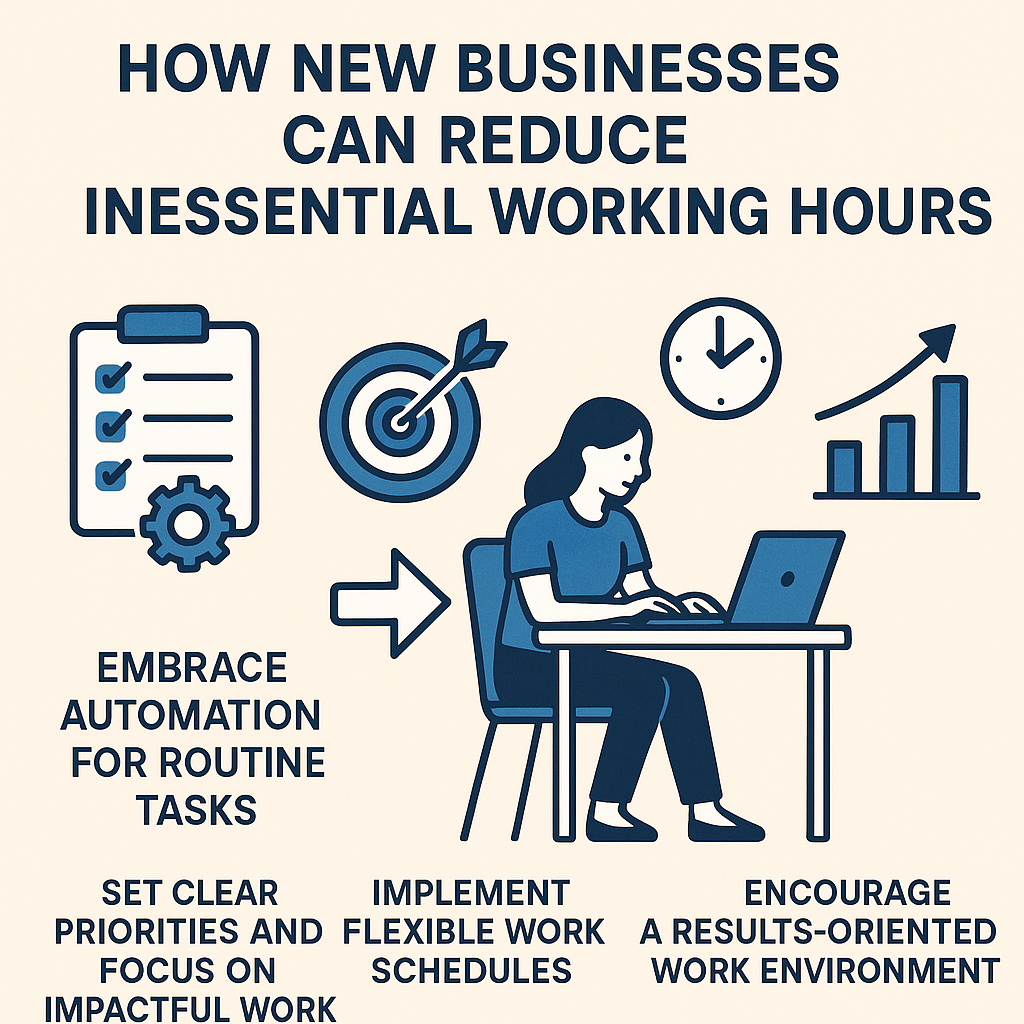reduce inessential – Starting a new business is an exciting yet challenging venture. One of the most important elements in ensuring your business runs efficiently and stays ahead of the competition is how you manage time – both for yourself and your employees. As companies scale, it becomes easy for workloads to increase, and long working hours can often seem like a badge of honor. However, more hours doesn’t necessarily equal more productivity. In fact, excessive working hours can lead to burnout, dissatisfaction, and decreased efficiency.
Reducing inessential working hours while maintaining productivity is a delicate balancing act. Here’s how new businesses can streamline operations and create a healthier work culture.
1. Embrace Automation for Routine Tasks
In the early stages of a business, you may find yourself spending hours on administrative tasks like managing invoices, scheduling, and responding to emails. While these tasks are essential, they are often repetitive and can eat into time that could be spent on more strategic work.
How to Implement:
-
Invest in software tools that automate routine processes. Accounting software like QuickBooks or Xero can automate invoicing, while tools like Zapier can automate workflows between different apps.
-
Use email filters and auto-responders to manage communication more effectively.
By automating these tasks, you free up time for your employees to focus on creative, high-value work that drives the business forward.
2. Set Clear Priorities and Focus on Impactful Work
A lack of clear goals and direction often leads to employees spending time on tasks that don’t contribute significantly to the business’s growth. A key aspect of reducing unnecessary working hours is ensuring that every employee understands their role and the impact of their work.
How to Implement:
-
Establish clear, measurable goals at the beginning of each project or quarter. Focus on results, not hours worked.
-
Break down large projects into smaller tasks with specific deadlines and deliverables.
-
Encourage employees to avoid multitasking. Studies have shown that multitasking can reduce productivity and increase errors.
This clarity will help your team focus on high-priority tasks that bring value to the business, cutting down time spent on low-impact work.
3. Adopt the 80/20 Principle (Pareto Principle)
The 80/20 rule is a powerful concept that suggests that 80% of results come from just 20% of efforts. Identifying and focusing on the tasks that yield the most significant results will help reduce the need for long working hours.
How to Implement:
-
Regularly evaluate which tasks or projects are producing the most value for your business. Shift focus away from activities that are low-return.
-
Encourage employees to spend the majority of their time on work that directly contributes to revenue, customer satisfaction, or business development.
By streamlining efforts and focusing on what truly matters, you can significantly reduce inessential working hours while boosting business output.
4. Implement Flexible Work Schedules
Flexibility in the workplace can greatly reduce unnecessary working hours. Instead of adhering to a traditional 9-to-5 schedule, new businesses can adopt flexible working hours, where employees choose when and how they work, as long as their deliverables are met.
How to Implement:
-
Allow employees to set their own hours or offer a hybrid work model (remote and in-office) that lets them work during their most productive times.
-
Encourage employees to take regular breaks to avoid burnout. Studies show that short breaks throughout the day can improve focus and productivity.
-
Use project management tools like Asana or Trello to track progress and ensure accountability, regardless of when employees work.
Flexible work schedules can reduce the stress of long commutes and help employees feel more balanced, leading to less time wasted on unnecessary tasks.
5. Encourage a Results-Oriented Work Environment (ROWE)
A Results-Oriented Work Environment (ROWE) is a management strategy that focuses on outcomes rather than the number of hours spent in the office. In ROWE, employees are evaluated based on what they accomplish, not how many hours they work.
How to Implement:
-
Set specific, measurable goals for employees and evaluate their performance based on results.
-
Trust your team to manage their time efficiently. When employees are given autonomy over their tasks and schedules, they are often more productive and engaged.
-
Use tools like Slack and Microsoft Teams to keep communication efficient and focused, reducing unnecessary back-and-forth.
By shifting the focus from hours to results, you allow your team to work more efficiently and avoid wasting time on tasks that don’t move the needle.
6. Delegate and Outsource Non-Core Activities
As a new business owner, it’s easy to feel the need to wear many hats. However, taking on too many tasks can spread your time thin and lead to burnout. Delegating tasks that are outside of your core competencies or not directly related to business growth can help reduce inessential working hours.
How to Implement:
-
Identify tasks that can be outsourced to freelancers or contractors. For example, marketing, social media management, and customer service can often be handled by external professionals.
-
Hire team members to focus on specific tasks instead of trying to do everything yourself.
By outsourcing and delegating effectively, you can focus on growing the business while minimizing the time spent on tasks that aren’t a good use of your time or skillset.
7. Promote a Healthy Work-Life Balance
Encouraging employees to maintain a healthy work-life balance is essential for long-term productivity. When employees are overworked, they can experience burnout, leading to reduced focus and lower-quality work. A balanced approach leads to higher job satisfaction and can ultimately reduce the need for long hours.
How to Implement:
-
Set boundaries around working hours. Encourage employees to disconnect after work hours and take time off when needed.
-
Foster a culture that values well-being by offering wellness programs or mental health resources.
-
Lead by example. As a business owner, model healthy working habits, such as taking regular breaks and avoiding after-hours work emails.
By promoting balance, you not only reduce inessential the risk of burnout but also create a more motivated and engaged workforce.
Conclusion: Efficiency Over Hours Worked
New businesses often fall into the trap of thinking that longer hours equal greater success. However, working smarter, not harder, is the key to creating a productive, healthy, and sustainable work environment. By embracing automation, setting clear priorities, offering flexibility, and promoting a results-driven culture, you can significantly reduce inessential working hours while boosting your business’s overall performance.
Remember, time is a limited resource. Use it wisely, and your business will be better positioned to thrive in a fast-paced, competitive environment.








